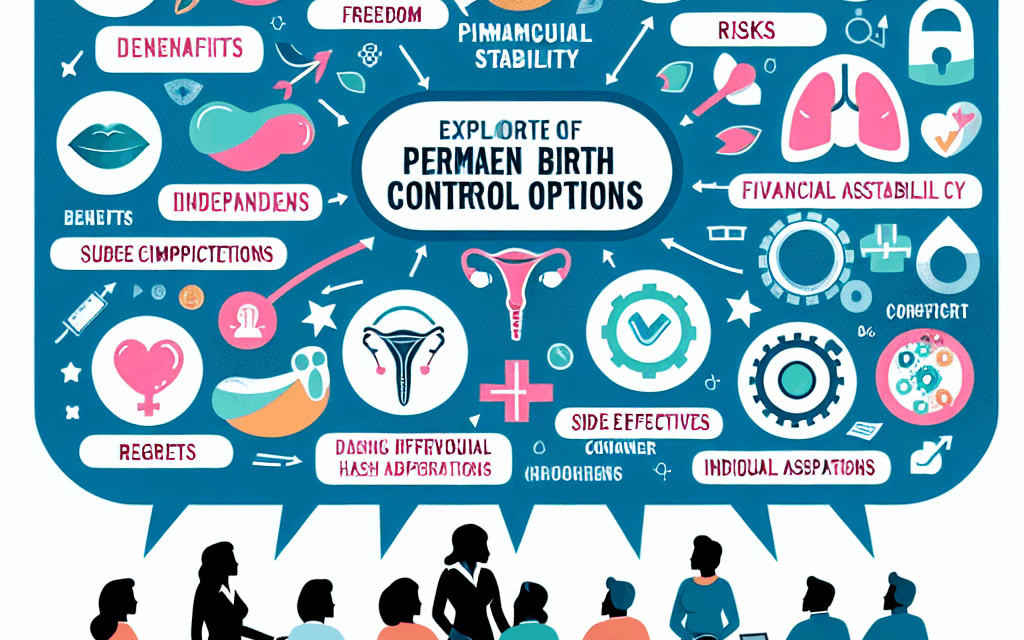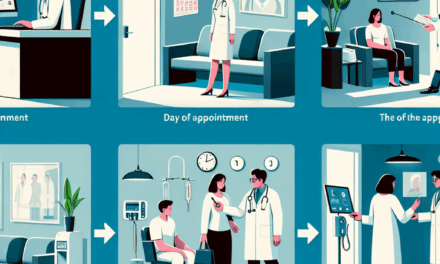Exploring Permanent Birth Control: Weighing Risks, Benefits, and Individual Aspirations
Permanent birth control, often referred to as sterilization, is a significant decision for individuals and couples who have decided that they do not wish to have children in the future. This article delves into the various aspects of permanent birth control, including its types, benefits, risks, and the personal aspirations that influence this choice. By examining these elements, we aim to provide a comprehensive understanding of permanent birth control and its implications.
Understanding Permanent Birth Control
Permanent birth control methods are designed to provide a long-term solution to prevent pregnancy. Unlike temporary methods such as condoms or birth control pills, permanent options are intended to be irreversible. The most common forms of permanent birth control include tubal ligation for women and vasectomy for men. Understanding these methods is crucial for individuals considering this life-altering decision.
Types of Permanent Birth Control
There are primarily two types of permanent birth control: tubal ligation and vasectomy. Each method has its own procedure, effectiveness, and considerations.
- Tubal Ligation: This surgical procedure involves blocking or sealing the fallopian tubes to prevent eggs from reaching the uterus. It can be performed through various techniques, including laparoscopic surgery, mini-laparotomy, or hysteroscopic sterilization. Tubal ligation is highly effective, with a failure rate of less than 1%.
- Vasectomy: This is a surgical procedure for men that involves cutting and sealing the vas deferens, the tubes that carry sperm from the testicles. Vasectomy is also highly effective, with a failure rate of about 0.15%. It is often performed under local anesthesia and can be done in a doctor’s office.
Both methods are considered safe and effective, but they require careful consideration and consultation with healthcare providers to ensure that individuals fully understand the implications of their choice.
Effectiveness and Reversibility
One of the primary reasons individuals choose permanent birth control is its effectiveness. Both tubal ligation and vasectomy have high success rates in preventing pregnancy. However, it is essential to note that while these procedures are designed to be permanent, there are options for reversal, though they are not guaranteed to be successful.
- Tubal Ligation Reversal: This procedure, known as tubal reanastomosis, involves reconnecting the fallopian tubes. Success rates vary based on factors such as the method of initial sterilization and the woman’s age.
- Vasectomy Reversal: A vasectomy can be reversed through a procedure called vasovasostomy, which reconnects the vas deferens. Success rates for this procedure can also vary, with factors such as the time elapsed since the vasectomy playing a significant role.
While reversibility is an option, it is not a guarantee, and individuals should be confident in their decision to pursue permanent birth control.
Benefits of Permanent Birth Control
Choosing permanent birth control comes with numerous benefits that can significantly impact an individual’s or couple’s life. Understanding these advantages can help in making an informed decision.
1. Long-Term Effectiveness
One of the most significant benefits of permanent birth control is its long-term effectiveness. Once a person undergoes a sterilization procedure, they no longer need to worry about unintended pregnancies. This peace of mind can lead to a more relaxed and fulfilling sexual relationship.
For couples who are certain they do not want children or have completed their families, permanent birth control eliminates the need for ongoing contraceptive methods. This can save time, money, and the hassle of remembering to take pills or use other forms of contraception.
2. Financial Considerations
While the upfront cost of permanent birth control procedures can be significant, they can lead to long-term financial savings. The cost of temporary contraceptive methods can add up over time, including the price of pills, condoms, and other supplies. In contrast, permanent birth control is a one-time expense that can ultimately be more economical.
Additionally, individuals who choose permanent birth control may avoid the costs associated with unplanned pregnancies, which can include medical expenses, childcare, and other related costs. According to a study by the Guttmacher Institute, the average cost of raising a child in the United States can exceed $230,000 from birth to age 18, making the financial implications of permanent birth control significant.
3. Health Benefits
Permanently sterilizing oneself can also have health benefits. For women, tubal ligation has been associated with a reduced risk of certain reproductive cancers, such as ovarian cancer. Additionally, individuals who choose permanent birth control may experience fewer hormonal side effects compared to those who use hormonal contraceptives.
For men, vasectomy is a low-risk procedure with minimal long-term health effects. Studies have shown that vasectomy does not increase the risk of prostate cancer or other health issues, making it a safe option for men who do not wish to father children.
4. Autonomy and Control
Choosing permanent birth control is an empowering decision that allows individuals to take control of their reproductive health. It provides a sense of autonomy over one’s body and family planning. For many, this decision is rooted in personal aspirations, lifestyle choices, and life circumstances.
Individuals who have made the choice to undergo permanent birth control often report feeling more in control of their lives and futures. This empowerment can lead to improved mental health and overall well-being.
5. Environmental Considerations
In an era where environmental sustainability is increasingly important, permanent birth control can also be viewed through an ecological lens. By choosing not to have children, individuals can reduce their carbon footprint and contribute to a more sustainable future. Each additional person on the planet contributes to resource consumption, waste production, and environmental degradation.
While this perspective may not be the primary motivation for everyone, it is an important consideration for those who are environmentally conscious and wish to minimize their impact on the planet.
Risks and Considerations of Permanent Birth Control
While there are numerous benefits to permanent birth control, it is essential to consider the potential risks and drawbacks associated with these procedures. Understanding these factors can help individuals make informed decisions about their reproductive health.
1. Surgical Risks
Both tubal ligation and vasectomy are surgical procedures, and as with any surgery, there are inherent risks involved. Potential complications can include infection, bleeding, and adverse reactions to anesthesia. While these risks are generally low, they are important to consider when deciding on permanent birth control.
For women undergoing tubal ligation, there may also be risks associated with the specific surgical technique used. For example, laparoscopic surgery may carry risks related to the use of carbon dioxide gas, which can lead to complications such as gas embolism or injury to surrounding organs.
2. Emotional and Psychological Impact
The decision to undergo permanent birth control can have emotional and psychological implications. Some individuals may experience feelings of regret or loss after the procedure, particularly if their life circumstances change. For example, a couple may decide to undergo sterilization after having children, only to later wish they had another child due to changes in their relationship or personal aspirations.
It is crucial for individuals to engage in thorough discussions with their partners and healthcare providers before making this decision. Counseling or support groups may also be beneficial for those who are struggling with the emotional aspects of permanent birth control.
3. Societal and Cultural Considerations
In some cultures, the decision to undergo permanent birth control may be met with societal stigma or pressure. Individuals may face judgment from family members or communities that hold traditional views on family size and reproduction. This societal pressure can complicate the decision-making process and lead to feelings of isolation or guilt.
It is essential for individuals to consider their cultural context and seek support from those who understand their values and beliefs. Open communication with family members and friends can help alleviate some of the societal pressures associated with this decision.
4. Potential for Regret
One of the most significant concerns regarding permanent birth control is the potential for regret. Studies have shown that a small percentage of individuals who undergo sterilization may later wish they had not done so. Factors contributing to this regret can include changes in personal circumstances, such as divorce or the loss of a child.
To mitigate the risk of regret, individuals should take the time to reflect on their decision and consider their long-term aspirations. Engaging in discussions with healthcare providers and trusted individuals can also provide valuable insights and support.
5. Alternatives to Permanent Birth Control
For those who are uncertain about permanent birth control, it is essential to explore alternative contraceptive methods. Temporary methods, such as hormonal birth control, intrauterine devices (IUDs), and barrier methods, can provide effective pregnancy prevention without the permanence of sterilization.
- Hormonal Birth Control: Options include pills, patches, and injections that can prevent ovulation and regulate menstrual cycles.
- IUDs: These devices are inserted into the uterus and can provide long-term contraception for several years without the need for surgery.
- Barrier Methods: Condoms and diaphragms can prevent sperm from reaching the egg and are reversible.
Exploring these alternatives can help individuals make informed decisions about their reproductive health without committing to permanent sterilization.
Individual Aspirations and Family Planning
The decision to pursue permanent birth control is often influenced by individual aspirations and life goals. Understanding these personal motivations can provide valuable context for this choice.
1. Career and Education Goals
For many individuals, career and education aspirations play a significant role in family planning decisions. Individuals may choose to delay parenthood or opt for permanent birth control to focus on their professional development. This choice allows them to invest time and resources into their careers without the added responsibilities of raising children.
Research has shown that women, in particular, may prioritize their education and career goals before considering starting a family. According to a report by the Pew Research Center, 56% of women aged 18-34 believe that having a successful career is more important than having children at this stage in their lives.
2. Relationship Dynamics
The dynamics of a relationship can also influence the decision to pursue permanent birth control. Couples who have established a strong partnership may feel more confident in their choice to undergo sterilization, while those in uncertain or unstable relationships may hesitate.
Open communication between partners is essential when discussing family planning and permanent birth control. Couples should consider their shared values, goals, and aspirations to ensure that they are on the same page regarding their reproductive choices.
3. Personal Health Considerations
Individuals with certain health conditions may choose permanent birth control as a means of managing their reproductive health. For example, women with conditions such as endometriosis or polycystic ovary syndrome (PCOS) may experience significant relief from symptoms after undergoing tubal ligation.
Additionally, individuals who have experienced complications during pregnancy or childbirth may opt for permanent birth control to avoid potential health risks in the future. Consulting with healthcare providers can help individuals make informed decisions based on their unique health circumstances.
4. Lifestyle Preferences
Personal lifestyle preferences can also play a significant role in the decision to pursue permanent birth control. Individuals who prioritize travel, hobbies, or other interests may choose to forgo parenthood in favor of pursuing their passions. This choice allows them to maintain a lifestyle that aligns with their values and aspirations.
For some, the desire for freedom and flexibility in their lives can be a compelling reason to consider permanent birth control. Understanding one’s lifestyle preferences can help individuals make choices that align with their long-term goals.
5. Societal Influences and Trends
Societal trends and cultural shifts can also impact individual decisions regarding family planning and permanent birth control. As societal norms evolve, more individuals are embracing diverse family structures and reproductive choices. The increasing acceptance of permanent birth control reflects a broader cultural shift toward individual autonomy and reproductive rights.
Understanding these societal influences can help individuals navigate their choices and feel empowered in their decisions regarding permanent birth control.
Conclusion
Permanent birth control is a significant decision that requires careful consideration of various factors, including risks, benefits, and individual aspirations. By understanding the types of permanent birth control available, the advantages they offer, and the potential drawbacks, individuals can make informed choices that align with their values and life goals.
Ultimately, the decision to pursue permanent birth control is deeply personal and should be made with thorough reflection and open communication with partners and healthcare providers. By weighing the risks and benefits and considering individual aspirations, individuals can take control of their reproductive health and make choices that best suit their lives.
As society continues to evolve, the conversation around permanent birth control will likely expand, offering new insights and perspectives on this important topic. Whether through personal experiences, cultural influences, or societal trends, the journey toward understanding permanent birth control is one that many individuals will navigate as they seek to define their futures.





